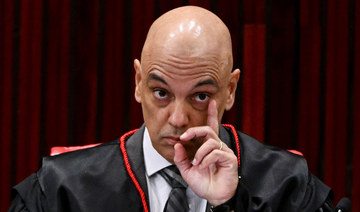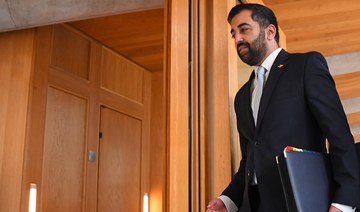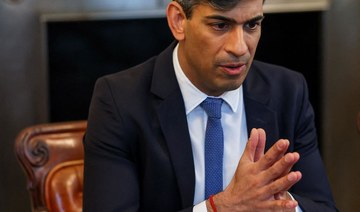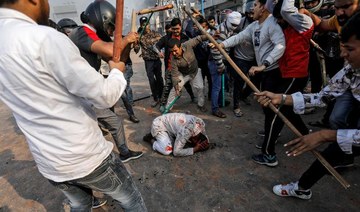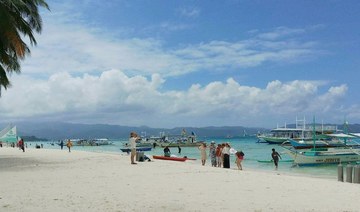PORT-AU-PRINCE, Haiti: Haiti’s interim government said Friday that it asked the US to deploy troops to protect key infrastructure as it tries to stabilize the country and prepare the way for elections in the aftermath of the assassination of President Jovenel Moïse.
“We definitely need assistance and we’ve asked our international partners for help,” Interim Prime Minister Claude Joseph told The Associated Press in an interview, declining to provide further details. “We believe our partners can assist the national police in resolving the situation.”
Joseph said that he was dismayed by opponents who’ve tried to take advantage of Moïse’s murder to seize political power — an indirect reference to a group of lawmakers have declared their loyalty and recognized Joseph Lambert, the head of Haiti’s dismantled senate, as provisional president and Ariel Henry, whom Moïse designated as prime minister a day before he was killed, as prime minister.
“I’m not interested in a power struggle,” Joseph said in the brief phone interview, without mentioning Lambert by name. “There’s only one way people can become president in Haiti. And that’s through elections.”
Joseph spoke just hours after the head of Colombia’s police said that the Colombians implicated in Moïse’s assassination were recruited by four companies and traveled to the Caribbean nation in two groups via the Dominican Republic. Meanwhile, the US said it would send senior FBI and Homeland Security officials to help in the investigation.
Haitian National Police Chief Léon Charles said 17 suspects have been detained in the brazen killing of Moïse that stunned a nation already reeling from poverty, widespread violence and political instability.
As the investigation moved forward, the killing took on the air of a complicated international conspiracy. Besides the Colombians, among those detained by police were two Haitian Americans, who have been described as translators for the attackers. Some of the suspects were seized in a raid on Taiwan’s Embassy where they are believed to have sought refuge.
At a news conference in Colombia’s capital of Bogota, Gen. Jorge Luis Vargas Valencia said four companies had been involved in the “recruitment, the gathering of these people” implicated in the assassination, although he did not identify the companies because their names were still being verified.
Two of the suspects traveled to Haiti via Panama and the Dominican Republic, Vargas said, while a second group of 11 arrived in Haiti on July 4 from the Dominican Republic.
In Washington, White House Press Secretary Jen Psaki said senior FBI and Department of Homeland Security officials will be sent to Haiti “as soon as possible to assess the situation and how we may be able to assist.”
“The United States remains engaged and in close consultations with our Haitian and international partners to support the Haitian people in the aftermath of the assassination of the president,” Psaki said.
Following Haiti’s request for US troops, a senior administration official reiterated Psaki’s earlier comments that the administration is sending officials to assess how it can be most helpful, but added there are no plans to provide military assistance at this time.
In Haiti, National Police Chief Léon Charles said another eight suspects were still at large and being sought.
Investigative Judge Clément Noël told the French-language newspaper Le Nouvelliste that the Haitian Americans arrested, James Solages and Joseph Vincent, said the attackers originally planned only to arrest Moïse, not kill him. Noël said Solages and Vincent were acting as translators for the attackers, the newspaper reported Friday.
The same newspaper quoted Port-au-Prince prosecutor Bed-Ford Claude as saying he ordered an investigative unit of the National Police Force to interrogate all the security agents close to Moïse. These include Moise’s security coordinator Jean Laguel Civil and Dimitri Hérard, head of the General Security Unit of the National Palace.
“If you are responsible for the president’s security, where have you been? What did you do to avoid this fate for the president?” Claude said.
The attack, which took place at Moïse’s home before dawn Wednesday, also seriously wounded his wife, who was flown to Miami for treatment.
Joseph assumed leadership with the backing of police and the military and declared a two-week “state of siege.” Port-au-Prince already has been on edge amid the growing power of gangs that displaced more than 14,700 people last month alone as they torched and ransacked homes in a fight over territory.
The killing brought the usually bustling capital to a standstill, but Joseph urged the public to return to work.
Vargas has pledged Colombia’s full cooperation, and authorities there identified 13 of the 15 Colombians implicated in the attack as retired members of the military, 11 captured and two killed. They range in rank from lieutenant colonel to soldier.
The commander of Colombia’s Armed Forces, Gen. Luis Fernando Navarro, said they had left the institution between 2018 and 2020.
“In the criminal world, there is the concept of murder for hire and this is what happened: they hired some members of the (army) reserve for this purpose and they have to respond criminally for the acts they committed,” said retired Colombian army general Jaime Ruiz Barrera.
Senior officials from Colombia’s security forces will travel to Haiti to help with the investigation.
US-trained Colombian soldiers are heavily recruited by private security firms in global conflict zones because of their experience in a decades-long war against leftist rebels and powerful drug cartels.
The wife of one former Colombian soldier in custody said he was recruited by a security firm to travel to the Dominican Republic last month.
The woman, who identified herself only as “Yuli,” told Colombia’s W Radio that her husband, Francisco Uribe, was hired for $2,700 a month by a company named CTU to travel to the Dominican Republic, where he was told he would provide protection to some powerful families. She says she last spoke to him at 10 p.m. Wednesday — almost a day after Moïse’s killing— and said he was on guard duty at a house where he and others were staying.
“The next day he wrote me a message that sounded like a farewell,” the woman said. “They were running, they had been attacked. ... That was the last contact I had.”
The woman said she knew little about her husband’s activities and was unaware he had even traveled to Haiti.
Uribe is under investigation for his alleged role in extrajudicial killings by Colombia’s US-trained army more than a decade ago. Colombian court records show he and another soldier were accused of killing a civilian in 2008 who they later tried to present as a criminal killed in combat.
The CTU in question may be CTU Security in Miami-Dade. The business has two listed addresses on its website. One was a shuttered warehouse with no sign indicating who it belonged to. The other is a simple office under a different company’s name where the receptionist says the CTU owner comes once a week to collect meal and hold the occasional meeting.
The US State Department said it was aware of reports Haitian-Americans were in custody but would not comment.
Solages, 35, described himself as a “certified diplomatic agent,” an advocate for children and budding politician on a now-removed website for a charity he started in 2019 in south Florida to assist resident of his home town of Jacmel, on Haiti’s southern coast.
Solages also said he had worked as a bodyguard at the Canadian Embassy in Haiti, and on his Facebook page, which was also taken down after news of his arrest, he showcased photos of armored military vehicles and a shot of himself standing in front of an American flag.
Canada’s foreign relation department released a statement that did not refer to Solages by name but said one of the men detained for his alleged role in the killing had been “briefly employed as a reserve bodyguard” at its embassy by a private contractor.
Calls to the charity and Solages’ associates went unanswered. However, a relative in south Florida said Solages doesn’t have any military training and doesn’t believe he was involved in the killing.
“I feel like my son killed my brother because I love my president and I love James Solages,” Schubert Dorisme, whose wife is Solages’ aunt, told WPLG in Miami.
Taiwan’s Embassy in Port-au-Prince said police had arrested 11 individuals who tried to break into the compound early Thursday. It gave no details of their identities or a reason for the break-in but in a statement referred to the men as “mercenaries” and strongly condemned the “cruel and barbaric assassination” of Moïse.
“As for whether the suspects were involved in the assassination of the president of Haiti, that will need to be investigated by the Haitian police,” Foreign Affairs spokesperson Joanne Ou told The Associated Press in Taipei.
Police were alerted by embassy security while Taiwanese diplomats were working from home. Haiti is one of a handful of countries with diplomatic relations with Taiwan.
Officials have disclosed little about the killing, other than to say the attack was carried out by “a highly trained and heavily armed group.”
Haiti’s interim PM confirms request for US troops to country
https://arab.news/ne4qw
Haiti’s interim PM confirms request for US troops to country
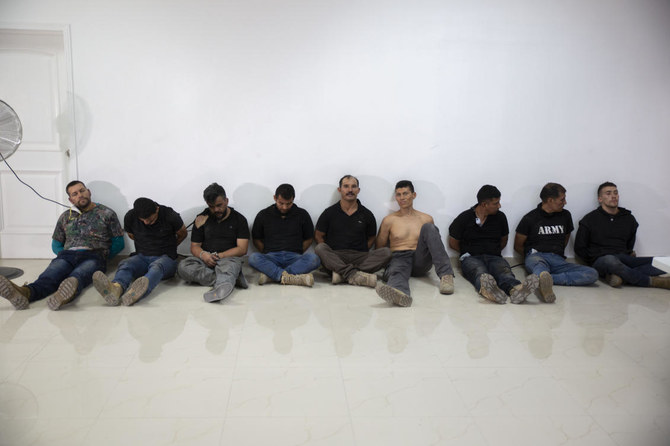
Race against time to rescue Brazil flood victims after dozens killed

- The rainfall eased Saturday night but was expected to continue for the next 24-36 hours, with authorities warning of landslides
PORTO ALEGRE, Brazil: Authorities were racing against time on Sunday to rescue people from raging floods and mudslides that have killed more than 50 and forced nearly 70,000 to flee their homes in southern Brazil.
Viewed from the air, Porto Alegre, the capital of Rio Grande do Sul state, is completely flooded, with streets waterlogged and the roofs of some houses barely visible.
The Guaiba River, which flows through the city of 1.4 million people, reached a record high level of 5.09 meters, according to the local municipality, well above the historic peak of 4.76 meters that had stood as a record since devastating 1941 floods.
The water was still advancing into economically important Porto Alegre and around a hundred other localities, with increasingly dramatic consequences.
FASTFACT
The Guaiba River, which flows through the city of 1.4 million people, reached a record high level of 5.09 meters, according to the local municipality, well above the historic peak of 4.76 meters that had stood as a record since devastating 1941 floods.
In addition to some 70,000 residents forced from their homes, Brazil’s civil defense agency also said more than a million people lacked access to potable water amid the flooding, describing the damage as incalculable.
The agency put the death toll at 55, although that did not include two people killed in an explosion at a flooded gas station in Porto Alegre that was witnessed by an AFP journalist.
At least 74 people are also missing, it said.
Rosana Custodio, a 37-year-old nurse, fled her flooded Porto Alegre home with her husband and three children.
“During the night on Thursday the waters began to rise very quickly,” she told AFP via a WhatsApp message.
“In a hurry, we went out to look for a safer place. But we couldn’t walk … My husband put our two little ones in a kayak and rowed with a bamboo. My son and I swam to the end of the street,” she said.
Her family was safe but “we’ve lost everything we had.”
The rainfall eased Saturday night but was expected to continue for the next 24-36 hours, with authorities warning of landslides.
Authorities scrambled to evacuate swamped neighborhoods as rescue workers used four-wheel-drive vehicles — and even jet skis — to maneuver through waist-deep water in search of the stranded.
UK Labour official acknowledges electoral backlash over Gaza

- Analysis shows decline of nearly 18 percent in Labour vote in areas where over a fifth of the population are Muslim
LONDON: A senior Labour official on Sunday said the party has to recalibrate its campaigning strategy to win back voters opposing its position on Gaza, The Observer reported.
Pat McFadden, Labour’s national election coordinator, told the BBC program “Sunday with Laura Kuenssberg” that it would “work to get people’s support back,” and that the Middle East is a “high foreign policy priority” for the party.
Analysis has revealed that despite substantial gains in Thursday’s local elections in England, as well as Sadiq Khan securing a third term as mayor of London, there was a decline of nearly 18 percent in the Labour vote in areas of the country where over a fifth of the population identify as Muslim.
The analysis, conducted across 930 wards by Prof. Will Jennings from the University of Southampton, highlighted the extent of the protest vote against Labour leader Keir Starmer’s stance on Gaza, particularly his delay in calling for a ceasefire.
Ali Milani, chair of the Labour Muslim Network, voiced concern over the sense of betrayal within the Muslim community.
“We are now seeing the electoral consequence of that,” Milani told The Obsever. “If I was a Labour MP in Bradford or Birmingham or Leicester or parts of London or Manchester, I would be seriously concerned.”
Jennings said: “What this highlights is certainly that Labour is in an uncomfortable position on Gaza. And it is not just Muslim voters.
“But in a general election when we are looking at an anti-incumbent mood and there are fewer small parties and independents, we shouldn’t expect the pattern to be repeated.”
Labour MP Ellie Reeves said: “We have recognized the strength of feeling on this issue. We have called for an immediate ceasefire, we have also said there should absolutely be no ground offensive on Rafah.”
When questioned about Labour’s previous stance on the war, she told The Observer: “Keir Starmer has always been clear that our position would always respond to what is happening there.”
Syrian asylum-seeker plans suicide if sent to Rwanda
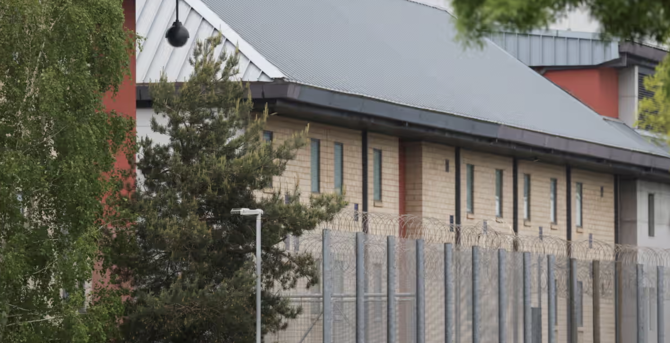
- Man identified as Khaled among more than 100 people set to be sent to East African country
- ‘I will not be safe in Rwanda. If they manage to send me there, I will kill myself on arrival’
LONDON: A Syrian asylum-seeker in the UK set to be deported to Rwanda has said he will kill himself if sent to the East African country.
The man, identified as Khaled, is being held at Colnbrook Immigration Removal Centre with a number of other people due to be sent to Rwanda.
He told The Guardian: “Everyone is so stressed in here because of Rwanda. We can’t eat and we can’t sleep. I was displaced in Syria for nine years and was imprisoned there and I was also detained and tortured in Libya.
“Being in detention is very triggering for me. What matters to asylum-seekers is to be safe. I will not be safe in Rwanda. If they manage to send me there, I will kill myself on arrival in that country.”
Khaled has been in the UK since 2022, and discovered he could be sent to Kigali for the first time in February 2023. He was detained with a view to removal last week.
“They arrested me and put me in handcuffs in a police cell. The same thing happened to two other people who were reporting — Iraqi Kurds. After we were taken out of the cell we were handcuffed again and taken in a van to the detention centre,” he said.
“I have been trying to see a doctor in the detention centre because of an infection in my leg I need antibiotics for but so far I haven’t managed to get an appointment.”
Another asylum-seeker who did not give his name, and who arrived in the UK from Sudan in 2022, told The Guardian that he had traveled via the Mediterranean and the boat he had been on almost sank.
“I would have been happy to claim asylum in Italy but Italian officials did not fingerprint me and told me to move on to France. There I was told it would be four years before they could consider my asylum claim so I waited in the jungle in Calais to cross to the UK. Crossing the Channel in an overcrowded boat was even more terrifying than crossing the Mediterranean,” he said.
“When I heard about the government’s plans to send asylum-seekers to Rwanda at the beginning of 2023 I was very frightened.
“I escaped from an African country because it was not safe and I am very scared to be deported to another African country because I know it will not be safe for me.
“I was arrested last week when I went to report in Newcastle. They didn’t mention Rwanda until I reached the detention centre and at first just said ‘We are deporting you to a safe third country.’”
The two men told The Guardian that they were struggling to contact legal representatives while in detention, with a seven-day deadline imposed by the Home Office for those wishing to appeal the decision to send them to Rwanda.
The charity Care4Calais has published data suggesting that of the more than 100 people detained to be sent to Rwanda, most come from war zones.
The charity’s head of legal access, Hannah Harwood, said: “The people detained have not had their asylum claims processed, and it’s clear from the first cohort we are in contact with that if their claims were processed they would probably be granted refugee status in the UK. It reaffirms how shameful the Rwanda plan is and why it must be stopped.”
A Home Office spokesperson said: “We take the welfare of people in our care extremely seriously. There are robust safeguarding measures in place to ensure everyone is treated with dignity and has the support they need.
“All detained individuals have access to a mobile phone, internet and landline telephones so they can keep in contact with friends, family and other support.”
Fake videos of Modi aides trigger political showdown in India election
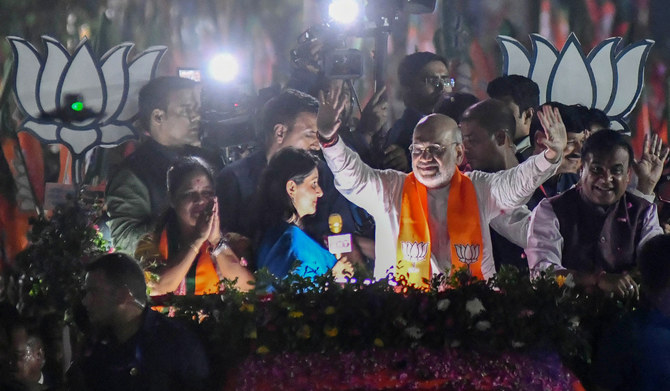
- Congress social media coordinator arrested by Delhi police
BENGALURU, LUCKNOW: Manipulated videos are taking center stage as campaigning heats up in India’s election, with fake clips involving two top aides of Prime Minister Narendra Modi triggering police investigations and the arrest of some workers of his rival Congress Party.
In what has been dubbed as India’s first AI election, Modi said last week fake voices were being used to purportedly show leaders making “statements that we have never even thought of,” calling it a conspiracy “to create tension in society.”
Indian police — already investigating the spread of fake videos showing Bollywood actors criticizing Modi — are now investigating a doctored online clip that showed Federal Home Minister Amit Shah saying the ruling Bharatiya Janata Party will stop certain social guarantees for minorities, a subject sensitive for millions of voters.
Shah retorted on X, posting his “original” and the edited “fake” speech and alleging — without providing any evidence — that the main opposition Congress was behind the video it created to mislead the public. The minister said “directions have been issued to the police to address this issue.”
Indian police arrested at least nine people, including six members of Congress’ social media teams, in the states of Assam, Gujarat, Telangana and New Delhi last week for circulating the fake video, according to police statements.
Five of the Congress workers were released on bail, but the most high-profile arrest made by the cyber crime unit of New Delhi police came on Friday, when they detained a Congress national social media coordinator, Arun Reddy, for sharing the video. New Delhi is one region where Shah’s ministry directly controls police. Reddy has been sent into three-day custody.
The arrest has sparked protests from Congress workers with many posting on X using the #ReleaseArunReddy tag. Congress lawmaker Manickam Tagore said the arrest was an example of “authoritarian misuse of power by the regime.”
Congress’ head of social media, Supriya Shrinate, did not respond to messages and an email seeking comment.
India’s election from April 19 to June 1 will be the world’s largest democratic event.
With nearly a billion voters and more than 800 million internet users, tackling the spread of misinformation is a high stakes job. It involves round-the-clock monitoring by police and election officials who often issue take down orders to Facebook and X as investigations start.
In India’s most populous state of Uttar Pradesh, more than 500 people keep tabs on online content, flagging controversial posts and coordinating with social media companies for their removal when needed, police chief Prashant Kumar told Reuters on Saturday.
Another fake video that sparked a storm last week showed Yogi Adityanath, the state’s chief minister, criticizing Modi for not doing enough for families of those who died in a 2019 militant attack.
Philippines seeks to position itself as top tourism destination at Arabian Travel Market
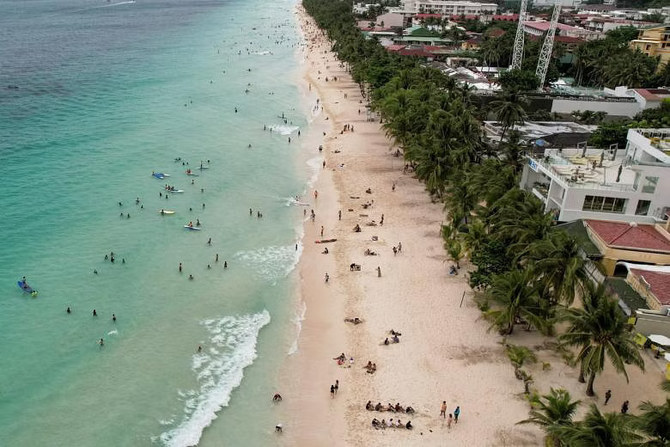
- Philippines has recorded 10 percent increase in visitors arriving from Gulf countries this year
- The country wants to become a preferred destination in Asia and the world
MANILA: The Philippines is working to attract more visitors from the Middle East and position itself as a preferred destination for international travelers, its tourism stakeholders said ahead of the Arabian Travel Market in Dubai.
More than 2,300 exhibitors and delegates from over 165 countries are joining the annual Arabian Travel Market, which this year will take place from May 6 to 9 at the Dubai World Trade Center.
In the Philippines, known for its white sandy beaches, diving spots and diverse culture, tourism is a key sector, contributing nearly 13 percent, or about $44 billion, to its gross domestic product in 2019.
The Department of Tourism will be leading the Philippine delegation in Dubai, as officials set their eyes on promoting the country’s best tourism to the international market.
“We look forward to these opportunities to share the Filipino story to the rest of the world … and to reinforce the Philippines’ position as a preferred destination and top-of-mind choice for travelers,” Secretary of Tourism Christina Garcia Frasco said in a statement.
With its participation at the Arabian Travel Market, the Philippines hopes to sustain the momentum from increased tourist arrivals from the Middle East, she added.
The Philippine tourism industry will not only promote their strengths, such as their tropical and natural attractions, but also diverse offerings in gastronomy and culture, as well as the Filipino tourism workers, “who serve as our best asset for their distinct hospitality and warmth,” Frasco said.
The Philippines has welcomed more 2 million international travelers since the beginning of the year, according to data from the tourism department. This includes a 10 percent increase in visitors arriving from Gulf countries, especially Saudi Arabia and the UAE, which has been among the Philippine government’s key emerging-market targets.
“There’s been a remarkable surge in outbound tourism from the Middle East, particularly from Gulf Cooperation Council countries … We see a growing appetite for international travel among GCC citizens and we see this trend continuing to rise in the coming years,” said Maria Margarita Montemayor Nograles, chief operating officer of the Tourism Promotions Board.
“This is one of the major reasons why we are doubling down on our efforts to maintain and enhance our presence in the Middle East. With our continued participation at the ATM, we aim to position the Philippines as a top-of-mind destination in Asia.”
Tourists from the Middle East are growing more important for some Filipino tourism operators, and represent a significant segment of their clientele, said Manih Karay, president of CTPH Tour.
“To appeal to tourists from Arab countries and promote the Philippines, we highlight the country’s natural beauty, rich cultural heritage, and warm hospitality … Their interest in exploring new destinations and cultural experiences aligns well with our commitment to providing inclusive and diverse travel services,” Karay told Arab News.
Arab tourists also contribute to the growth of the Philippines’ tourism industry, Karay said, adding that they foster cultural exchange and economic development.
“Their visits not only enrich our travel experiences but also promote mutual understanding and appreciation among different cultures,” she said.



